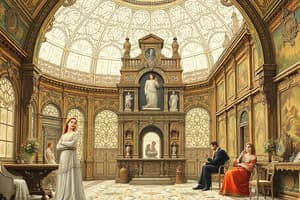Podcast
Questions and Answers
What is French Classicism?
What is French Classicism?
- The style of science during the Renaissance
- Music from the Baroque period
- Art and Literature during the time of Louis XIV (correct)
- Architecture in ancient Rome
Who was Moliere?
Who was Moliere?
A French playwright and actor who was a master at comedies.
What is Poussin known for?
What is Poussin known for?
Being a classical painter.
Who was Lully?
Who was Lully?
What did Couperin create?
What did Couperin create?
What type of music did Charpentier create?
What type of music did Charpentier create?
What themes did Racine focus on in his plays?
What themes did Racine focus on in his plays?
Who was Tellier?
Who was Tellier?
What role did Martinet serve?
What role did Martinet serve?
What was the League of Augsburg?
What was the League of Augsburg?
What was the capitation tax?
What was the capitation tax?
What characterized the Wars of Louis XIV?
What characterized the Wars of Louis XIV?
What was the outcome of the War of the Spanish Succession?
What was the outcome of the War of the Spanish Succession?
Who was the Duke of Marlborough?
Who was the Duke of Marlborough?
What did the Peace of Utrecht state?
What did the Peace of Utrecht state?
What did the aftermath of the wars represent?
What did the aftermath of the wars represent?
Flashcards are hidden until you start studying
Study Notes
French Classicism
- Period characterized by art and literature flourishing under Louis XIV.
- Notable for its emphasis on order, harmony, and clarity in artistic expression.
Molière
- Renowned French playwright and actor, originally named Jean-Baptiste Poquelin.
- Mastered the genre of comedy, influencing theater with works like "Tartuffe" and "The Misanthrope."
Nicolas Poussin
- Influential classical painter known for his historical and mythological subjects.
- His works emphasized clarity, logic, and metropolitan culture.
Jean-Baptiste Lully
- Prominent orchestral producer and composer favored by Louis XIV.
- Played a significant role in establishing French opera.
François Couperin
- French composer renowned for his compositions for the organ.
- His music reflected the elegance and sophistication of the French Baroque style.
Marc-Antoine Charpentier
- Renowned for creating significant religious music during the French Baroque period.
- His compositions are notable for their emotional depth and complexity.
Jean Racine
- Influential playwright known for his tragedies focused on intense emotional conflicts.
- Explored themes like love's power and moral dilemmas between good and evil.
Louvois
- Secretary of State for War under Louis XIV, known for the expensive nature of his military campaigns.
Jean Martinet
- Drill master responsible for training Louis XIV's army, emphasizing discipline and effectiveness.
League of Augsburg
- Coalition formed to counter Louis XIV's territorial expansions.
- Engaged in the War of the Grand Alliance against France.
Capitation Tax
- Levy introduced by Charles I, aimed at raising funds to combat Scottish uprisings.
- Reflects tensions between England and Scotland regarding religious imposition.
Wars of Louis XIV
- Conducted continuous military campaigns throughout 33 of his 54-year reign.
- Expanded the French army significantly from 25,000 to 250,000 but faced criticism for recruiting from the underclass.
- Ultimately led to a depletion of France's resources without substantial territorial gains.
War of the Spanish Succession
- Conflict arising from attempts to position a French ruler on the Spanish throne.
- Resulted in a defeat for France by the Holy League, yet Louis XIV's grandson eventually inherited the throne.
Duke of Marlborough and Battle of Blenheim
- English General John Churchill, later titled Duke of Marlborough, led victorious forces during the Battle of Blenheim.
- This victory significantly bolstered English military reputation and power in Europe.
Peace of Utrecht
- Agreement that prevented the unification of Spain and France, drawing an end to the War of the Spanish Succession.
- Marked a shift in European power dynamics, curbing French expansionism.
Aftermath
- Established a balance of power system to ensure stability in Europe.
- Helped alleviate the strife and suffering caused by prolonged warfare, redistributing territories among nations.
Studying That Suits You
Use AI to generate personalized quizzes and flashcards to suit your learning preferences.




